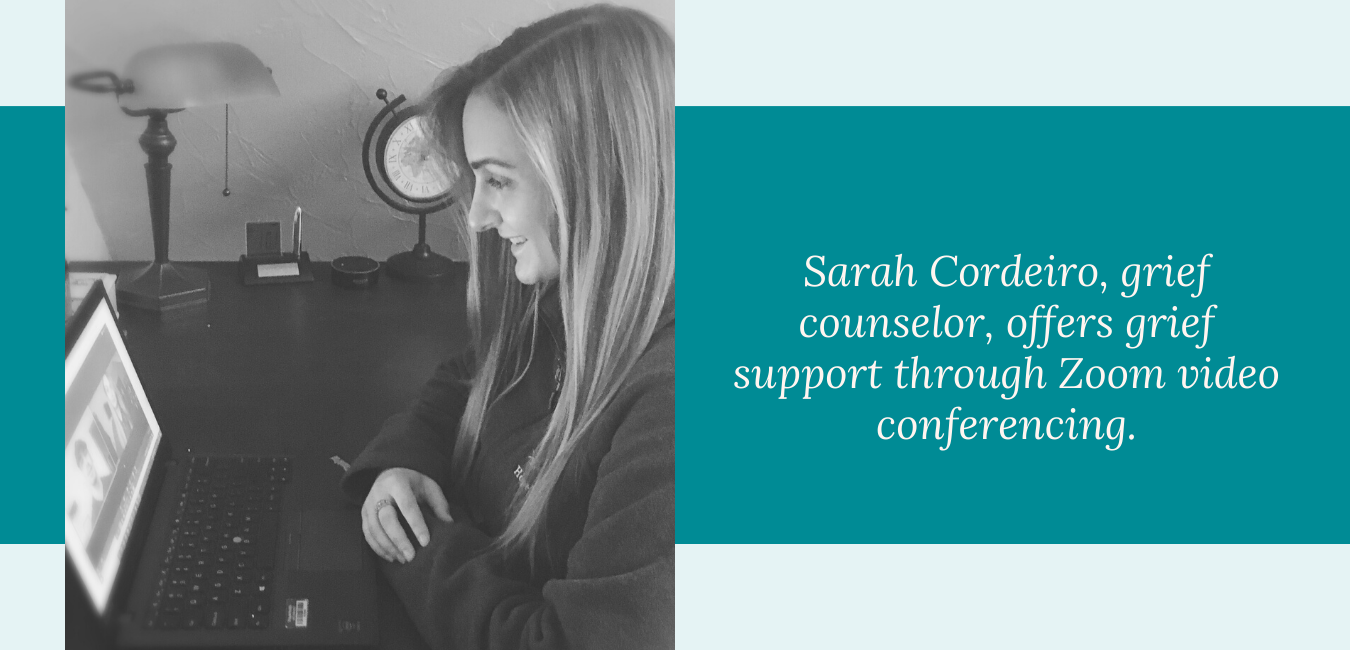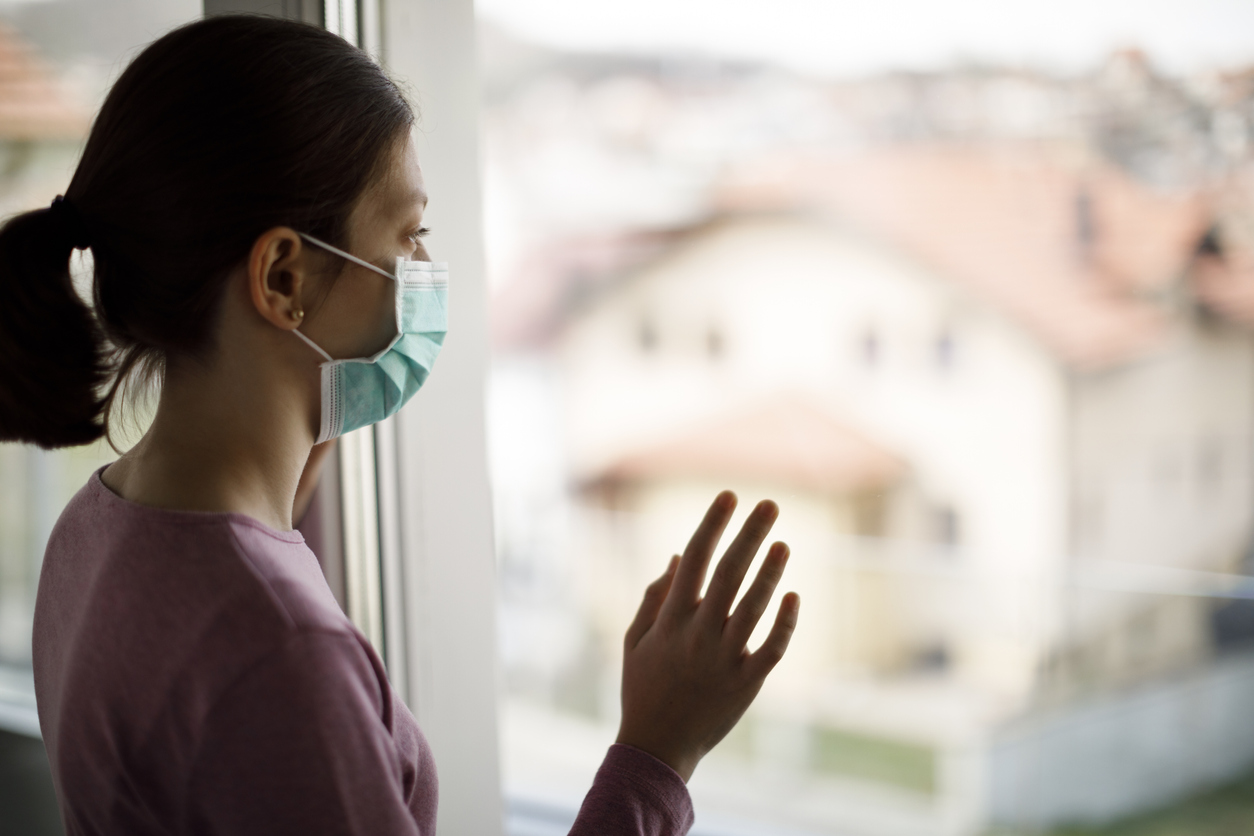Sarah Cordeiro is a grief counselor at HopeHealth. She counsels people one-on-one, leads grief support groups and runs Camp BraveHeart, a summer camp for children and teens who have lost a loved one.
HopeHealth sat down with Sarah to talk about the grief that people are feeling in the coronavirus COVID-19 pandemic. She also talks about this topic in this video.

HopeHealth: Sarah, how has your work changed since the coronavirus pandemic started?
Sarah: I still provide individual grief support for people over the phone or virtually over video chat. I also run some of our virtual grief support groups almost every day over Zoom. I have a group for children and teens, a caregiver support group for hospice families, and a loss-due-to-COVID-19 grief support group.
All of our support groups are free of charge and open to the community.
What is grief?
That’s a big question! Grief is so many things. Grief is any feeling you experience after some type of loss. People experience grief with, of course, the loss of a loved one. But they also feel grief after the loss of other things, like a job, financial security, routine—a lot of the things that people are experiencing right now.
What do we feel when we’re experiencing grief?
You could feel a lot of different things. Of course, sadness—I think that’s the first emotion people think of. There’s also confusion, anger and just feeling uncomfortable, like you don’t have your ground. Anxiousness, too—that’s a big one people are experiencing right now.
How is COVID-19 affecting people’s grief?
In my groups and one-on-one, conversations about COVID-19 sometimes supersede conversations about the loss of a loved one. I’m hearing, “I can’t go outside,” “I wasn’t able to see my loved one before they died,” “I’m not able to have a funeral service.”
I had thought people who lost someone before the crisis would have more time to be present with their grief and it would be easier for them to work through this. That’s not the case at all. A lot of people can’t touch their grief work right now because what’s happening in the world is just so scary. There’s not enough room in their brains to address the grief because what is going on is just so anxiety-provoking already, that trying to tackle the grief is just way too much for them to even imagine.
Could the stress and impact of the pandemic reawaken old grief?
Absolutely, I think any type of loss brings back previous losses. If you lost your husband, and now you can’t go to work, that’s another loss that puts grief back in your space. Now you have to address it again.
How are children who are grieving a loss dealing with COVID-19?
I think we have this misconception that kids are so excited they don’t have to get up to go to school. But they’re really feeling it. They’re grieving the loss of their structure.
Structure to kids is so important, especially for kids who are grieving the loss of a loved one. They don’t have that support system right now—their friends, teachers, guidance counselors—even the support of routine, being able to go to English class after math class.
What do you say to kids feeling that way?
It’s so important to validate their feelings right now because we’re not going to fix this. I just say, “Yes, this really does stink. This is really awful that you’re going through this.”
Validation is so important because as adults we are always trying to fix things for kids. A child comes up to you and is crying because someone bullied them: I think a lot of people’s first instinct is to say, “Oh, don’t cry. It’s okay, here, have this ice cream.” Adults sometimes can have a hard time listening to kids.
Validating that this situation is hard is so important because it makes them feel, “Yes, I know what I’m feeling, and it’s okay to feel this way. I’m not wrong or crazy for feeling like this.”
Let’s talk about ways to cope. How do we take care of ourselves?
That’s a really hard question because just like grief, how we care for ourselves is totally unique. And the things we do for self-care in normal times are different than now when we are quarantining. I can’t go to the gym right now. Some people can’t visit their senior center, or walk around and go to shops and restaurants.
We’re all totally starting from scratch, and it’s a trial-and-error experience. You have to find what works for you.
Try baking something. Try gardening. Try taking 10 minutes to relax. Writing is a very good self-care technique.
Before the crisis a lot of people would say, “I don’t have time to do this.” Well, now you do! So why don’t you start?
Talk more about writing. Why is that therapeutic?
Writing is extremely therapeutic. Saying something out loud is not the same as writing it down. You can read what you wrote, which is cathartic because you’re experiencing the feeling in a different way. Then you can close the journal, put it away, and it’s out of your mind for now.
Even writing down a few words, how you’re feeling in that moment, can relieve anxiety. For a lot of people it’s hard to verbalize feelings. Writing it down is a lot easier.
What are other coping techniques that people can try?
Creating anything is really helpful. A lot of people start gardens or bake or draw. Or you could make a self-care box.
What’s a self-care box?
A self-care box is something you can go to that you know will relieve anxiety. You fill it with things that help you.
Find a box somewhere in your house. Some people have been doing online shopping lately like myself, so I have extra boxes. You can decorate it if you want. If I were to decorate a box now, I’d put the ocean on it because that’s something that I wish I could go to right now.
Then put things in the box that make you feel safe, relaxed, less anxious, happy. It could be a variety of things. Maybe a pen and paper to write with. Try to think of your five senses.
Something that smells—maybe you put in lavender oil or whatever scent feels good to you.
Something you can touch—I have this little sponge at home that I cut, and it’s been like my best friend. It’s something tactile for me to fidget with and it relieves anxiety. That’s something I would put in my self-care box if I were to create one right now.
For people who have lost a loved one, put something in there that reminds you of a happy memory with that person. That’s something you can go to feel some relief.
A lot of kids put slime in their box. That’s perfect!
What can people do if they’re feeling stress while quarantining with others?
I think it’s very important to take space in those situations, especially for people who are already grieving in a family unit. Everyone grieves differently, and being on top of each other all the time is not helpful.
I suggest taking space. I know that’s hard if you’re in a small living space, but even going to the bathroom and shutting the door and taking a few deep breaths is important.
Trying to add some structure to your day. “Mommy gets to go in the bedroom with the door shut for the next hour and have her time. Mommy needs that time, and Daddy’s going to take care of the kids.”
Communication is also important. I once counseled a family with four kids that lost their mother. The youngest one was 13 and the oldest one was 19, and they were at each other’s throats. One of them liked to play music really loud—it reminded her of her mom—and the other one did not like that because it made him sad.
I got them all together to talk and share what they were experiencing.
“I like to listen to music that reminds me of Mom. Respect that, please.”
“I don’t really like to hear the music that reminds me of Mom. So can you tell me when you’re going to play it, and then I can go to another room.”
That’s the kind of communication that needs to happen.
Let’s talk about joy. Is it okay to feel joy in times of crisis?
It’s absolutely okay and really important to feel joy and find joy. It’s very important to find some sort of joy or else we’re all going to go crazy. We need to experience the spectrum of emotions.
As far as how do we find it, I think that’s just as unique as you may be as a person. For me, it’s having a deep conversation with my significant other, or it’s talking on FaceTime with my mom who I haven’t seen in a long time. Writing for me is great, smelling one of my favorite candles—those small things bring me joy.
For somebody else, it might be getting outside in the garden. It might be, like I said, baking something or drawing or just talking to somebody they love and miss.
Any other ideas?
I have one last story that I thought was really neat.
I was talking to a woman whose mom recently died. She was having trouble getting out of bed, so she and her friends started a little support group. They have a rule where every morning they have to send each other a selfie and a picture of their made bed to prove they got up that day. She said that it’s been so helpful, it makes her feel less alone and gives her a reason to get up. I thought that was really cool.

